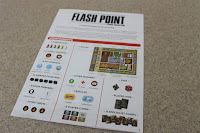 King of Tokyo was my present to myself for my birthday. I played a friends copy first and it seemed like it could be fun for lots of different kinds of players. It doesn't disappoint. The art is adorable, and gameplay is quick and competitive, and it has the perfect balance of luck and strategy. It's one of my favorite games to play with my family and non-gamer friends, but I pull it out with my tabletop game group fairly often as well.
King of Tokyo was my present to myself for my birthday. I played a friends copy first and it seemed like it could be fun for lots of different kinds of players. It doesn't disappoint. The art is adorable, and gameplay is quick and competitive, and it has the perfect balance of luck and strategy. It's one of my favorite games to play with my family and non-gamer friends, but I pull it out with my tabletop game group fairly often as well.TNG score:
 Story - 4
Story - 4In this game you are monsters attacking the city of Tokyo. If only all those other monsters would leave you alone to your work, right? Only one can be king of the hill, or city as the case may be. Each character does have a name and picture, but no back story or individual strengths. However, your strength and health do change as the game goes along so there is some character progression.
Immersive - 2
This is a basic dice game, and besides the art and monster character progression, there isn't a whole lot about this game that immerses you in the story. There are cards that you can buy (and adorable little glass energy cubes to buy with) that do boost the immersive score a little.
Learning Curve - 3
Almost everything in this game is pretty self-explanatory, and the main game mechanic is similar to Yahtzee so most people catch on to it quick. There are some complexities that give the game variety and interest, but I would say even if nobody had every played the game before, you could probably learn it in fifteen minutes.
 Time - 2
Time - 2Thirty minutes is a pretty good estimation for this game, not counting learning time. I've had it take almost an hour, but only because someone was determined to kill everyone else off to win. Half-hour seems to be the sweet spot for non-gamers: any longer than that and they can get bored. So this game works well for any group.
 Total - 2.75
Total - 2.75While I wouldn't recommend this game for your grandparents unless they are serious gamers, I do think this game works for most groups. It is quick to learn, competitive without being brutal (in most cases) and has the cutest art and game pieces. It isn't high is nerdiness, but I have yet to meet a nerd who didn't enjoy it.
































